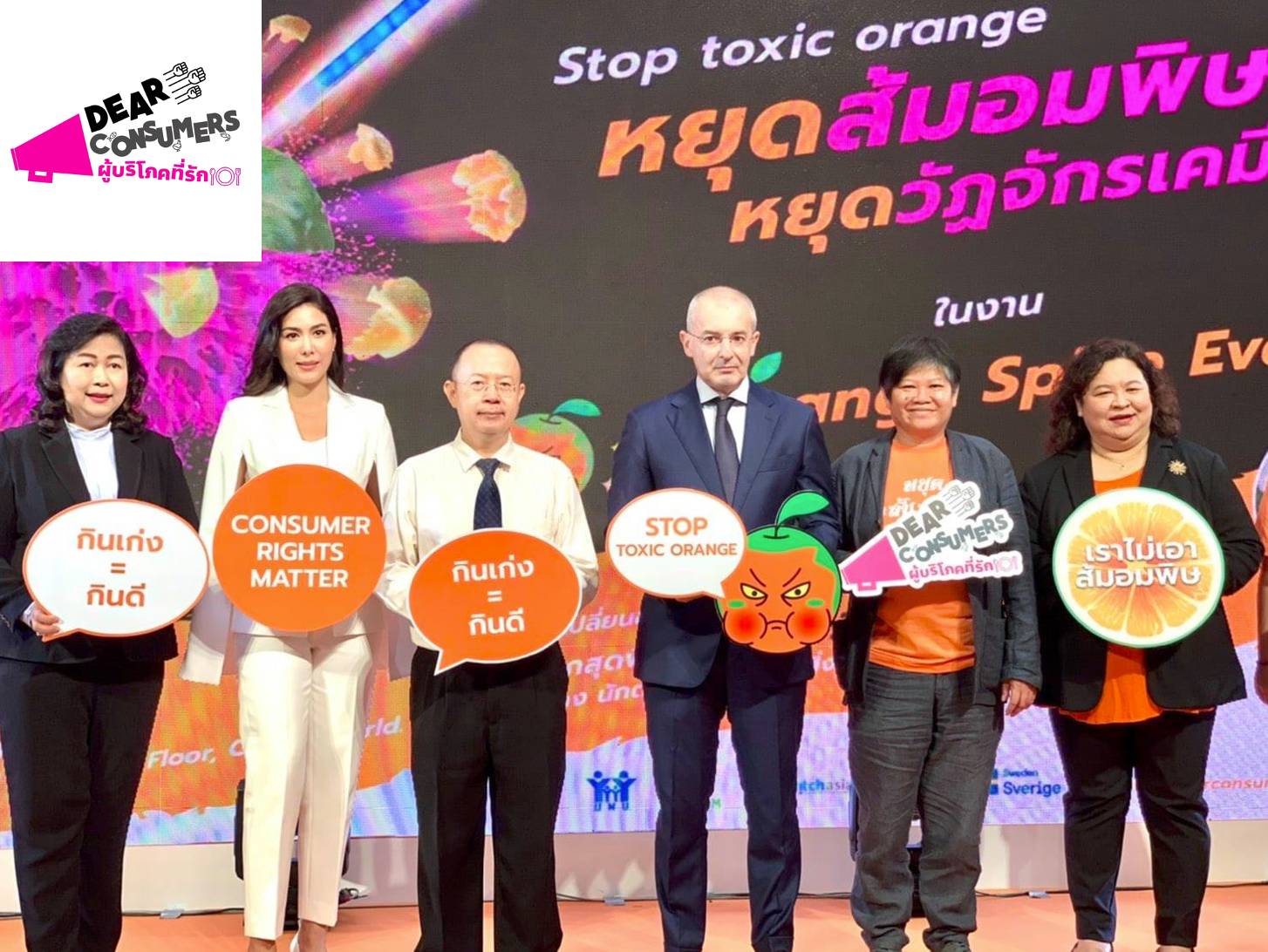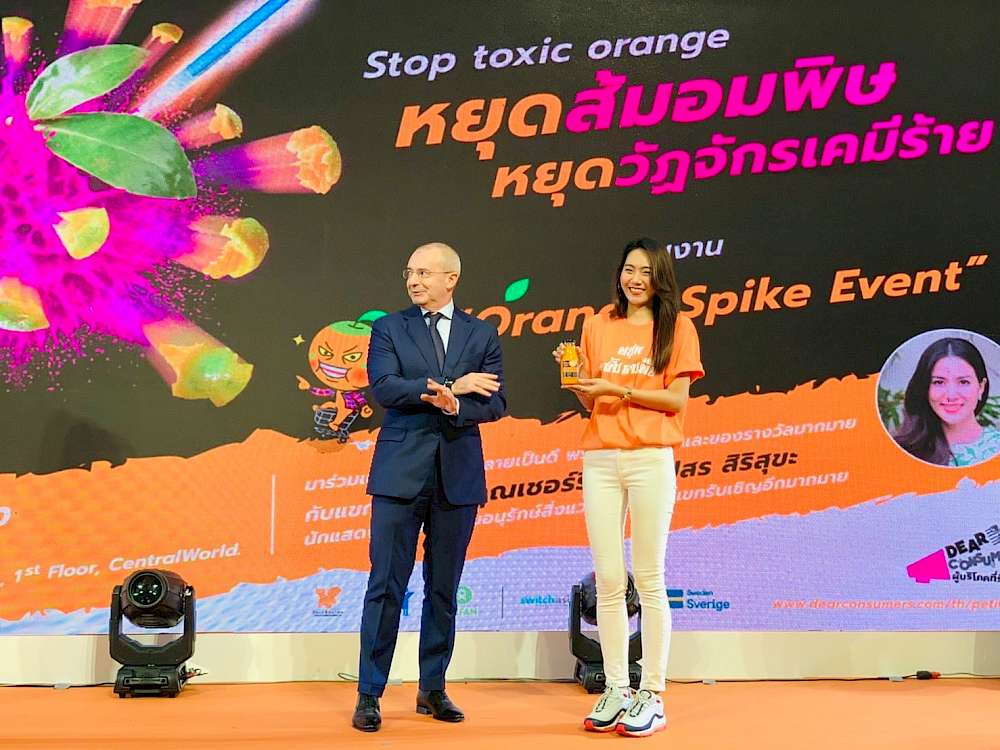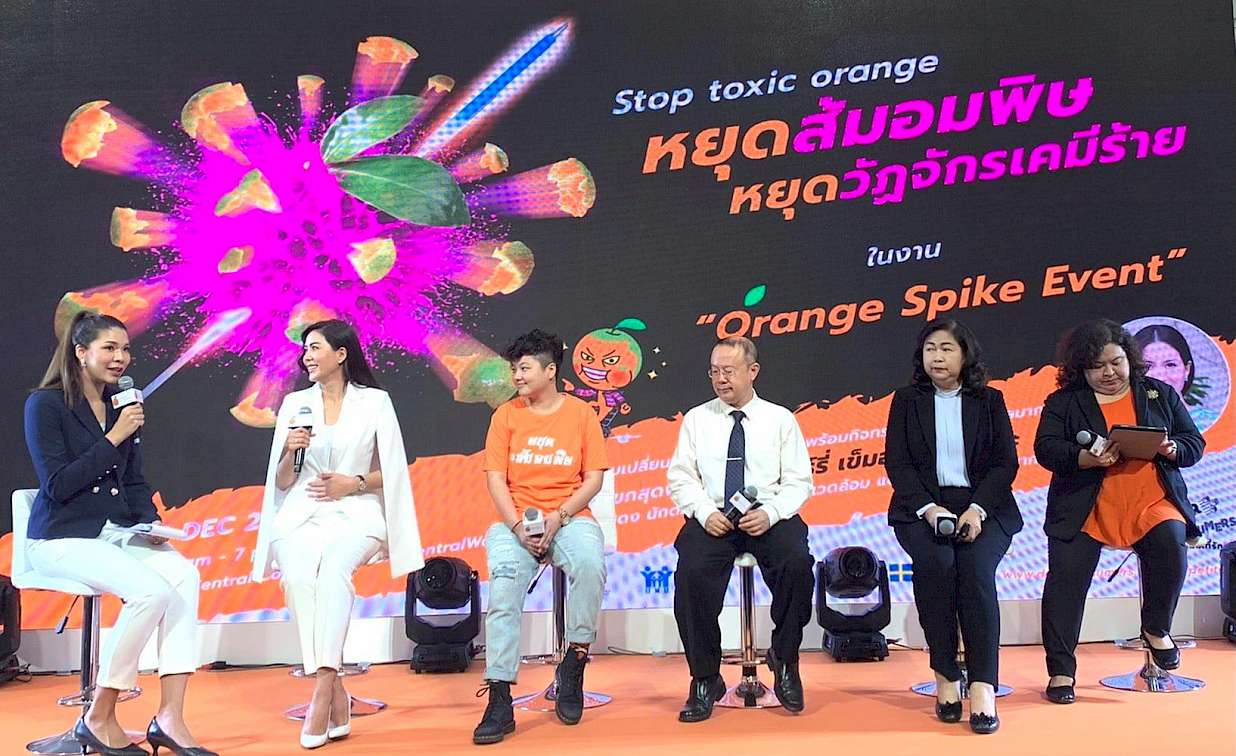
Join Orange Spike, exercise your consumer rights, and stop "Toxic Oranges"!
Sign the Dear Consumers Campaign petition at www.dearconsumers.com/th/petition
December 02, 2020, Bangkok: The network of Food4Change, Foundation for Consumers, and Oxfam in Thailand have reported that consumers in Thailand consume toxic oranges all year round as the level of pesticide residues in oranges sold in the market exceeds permitted level. These pesticides used in the production of oranges are harming not only human health but also the environment. The network, therefore, urges consumer participation to break the cycle of toxic oranges from the very start of the supply chain through the Orange Spike consumer rights movement. The activity prompts consumers to petition for transparent and efficient traceability in supermarkets' supply chains and calls for action from leading supermarkets to display QR codes as a means to prove that oranges sold at their outlets are free of pesticide residues. The traceability approach is aimed at pushing orange growers to reduce pesticide usages, forcing distributors to screen the source of fresh orange products, and urging the public authorities to impose pesticide control measures on the production of oranges.
Promoting a healthy and sustainable diet is important in the context of a comprehensive EU food policy. At the heart of the European Green Deal, the Farm to Fork Strategy adopted earlier this year aims at a fair, healthy and environmentally-friendly food system. It is necessary to significantly reduce the use of chemical plant protection products, of fertilisers and antibiotics, while increasing organic farming, said Mr Giuseppe Busini, Deputy Head of Mission, EU Delegation to the Kingdom of Thailand.
Ms Kingkorn Narintarakul Na Ayuthaya, Representative of BIOTHAI, said that oranges have great economic value in a large-scale supply chain and have been associated with consumer's daily life in many aspects. However, according to research conducted by the Thai Pesticide Alert Network (Thai-PAN), the pesticide contamination in oranges sold in the market exceeds the Maximum Residue Level (MRL). The research found 55 types of pesticide residues, or as much as *0.364 mg., in every single one of the orange samples. These pesticide residues include 28 chemical compounds which can be absorbed into the human body such as Carbendazim that causes risks of congenital malformations and impaired fertility, Carbofuran that is toxic to brain cells and sexual hormones, and Acetamiprid that can cause effects on the brain and the nervous system. Although the issue has been raised many times, the recent survey found that 100% of orange samples have the content of pesticide residues that exceeded the permitted level. These samples were collected from different fruit retailers, including leading supermarkets which claim to have adopted food safety standards.


Miss Saree Ongsomwang, secretary-general of the Foundation for Consumers, said that oranges are in season between December and March, which is considered the best time for consumption. However, as oranges are in demand all year round, pesticides are heavily used in their off-season production covering phases of flowering, fruiting, maturing, and harvesting. Most of the chemicals used in these processes are systemic pesticides which are absorbed and circulated through orange stems and pulp.
Another critical factor that turns oranges into toxic fruits is the demand for smooth, bright, golden-skinned oranges. As supermarkets tend to select these shiny smooth-skinned oranges to meet the consumer demand, orange growers heavily use chemical pesticides, as much as 52 times a year or in every week, to ensure that the appearance of their oranges is up to the selection criteria. To break the toxic orange cycle, it is vital that consumers gain adequate information about fruit production and adjust their consumption attitudes towards the selection of fruits —for example, choosing seasonal or less perfect-looking fruits to reduce the health risks from pesticides.
In addition, consumers have the right to be informed about the journey of fresh orange products. Supermarkets must convey their sincere concern for consumer welfare through transparent and efficient traceability in their supply chain and food safety standards. According to a recent survey, food safety inspection system at some of the supermarkets in Thailand failed to meet with proper standards.
Ms Thanita Wongprasert, Campaign Officer at Oxfam in Thailand (Oxfam), said that Orange Spike is a movement carried out under the campaign, "Dear Consumers", to enhance consumer awareness on the production of oranges which involves pesticide usage that is harmful to health and the environment. Orange Spike urges consumer participation to call for action from supermarkets to stop the toxic oranges at the upstream supply chain. By focusing on effective traceability, the campaign demands supermarkets - an intermediary between consumers and producers, to encourage their food suppliers, including orange growers, to strengthen efforts on food safety standards.
The Orange Spike movement is operated by an associate network, formed by Food4Change, Foundation for Consumers, and Oxfam in Thailand, and supported by the European Union through the SWITCH-Asia Programme and The Swedish International Development Cooperation Agency (Sida). The activity calls consumers to exercise their rights by signing an online petition at at www.dearconsumers.com/th/petition to demand leading supermarkets, including Makro, Big C, Tesco Lotus, and Tops, to display QR codes which provide information on the journey of their fresh orange products to prove that oranges sold at their outlets are free of pesticide residue. Besides, the movement expects authorities to impose chemical control measures on all types of orange production.
Join Orange Spike, exercise your consumer rights, and stop "Toxic Oranges" now through the Dear Consumers Campaign at www.dearconsumers.com/th/petition
For more information visit facebook.com/DearConsumers or SWITCH-Asia Dear Consumers page.
#ส้มอมพิษ #ส้มอมพิษให้มันจบที่ล็อตนี้ #หยุดส้มอมพิษ #เราไม่เอาส้มอมพิษ #ดราม่าส้มอมพิษ #ToxicOrange #StopToxicOrange


